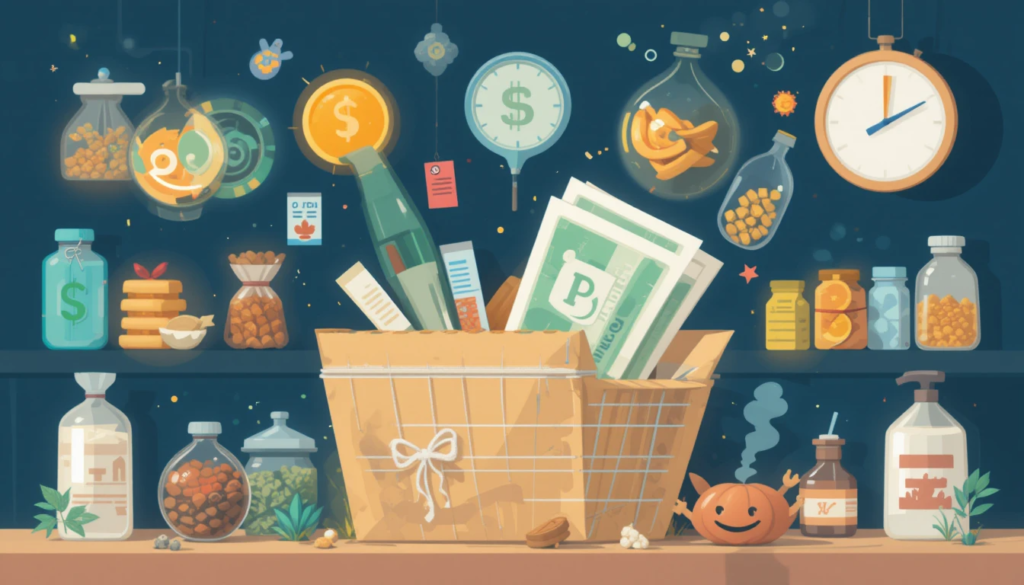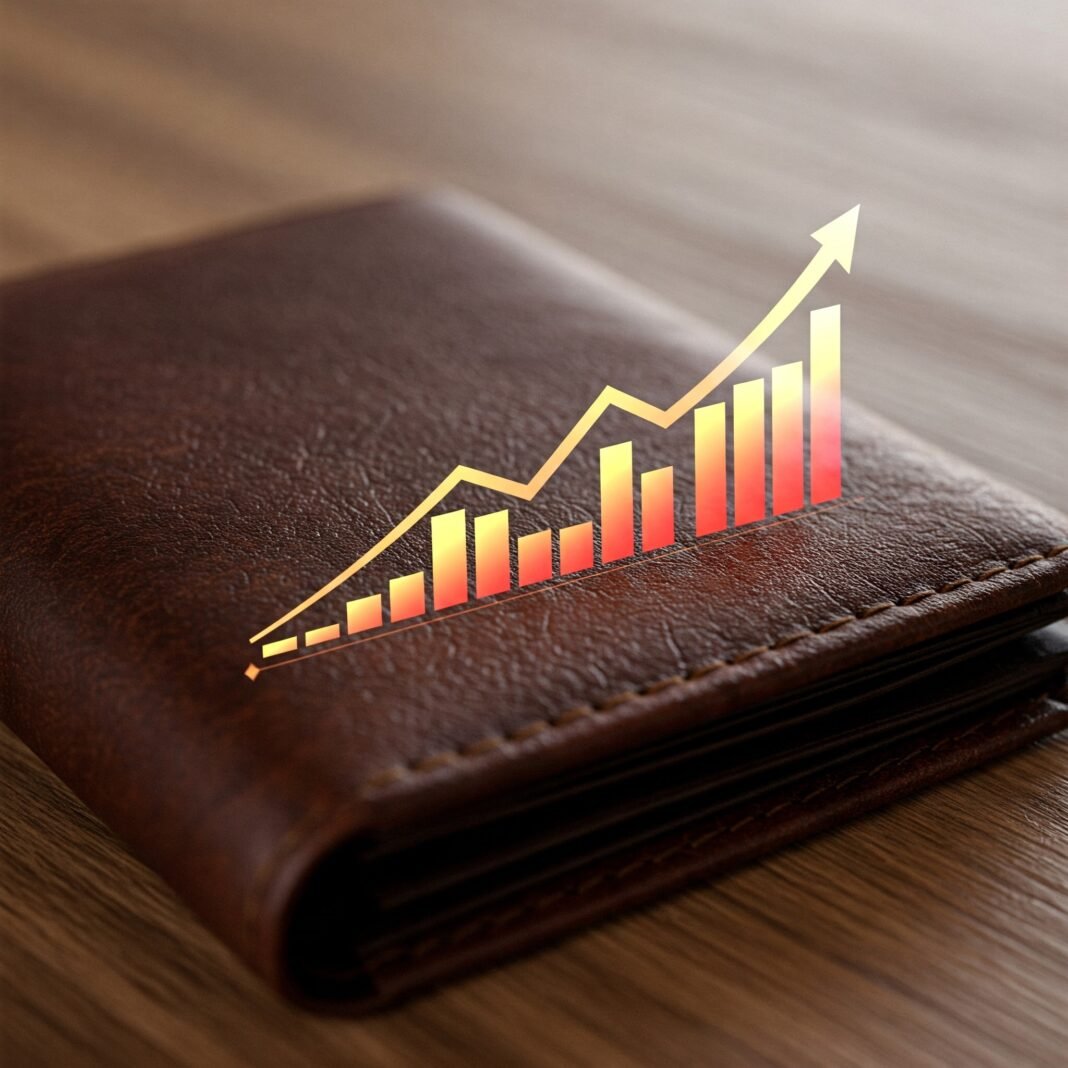Have you noticed lately that everything just feels… more expensive? It’s not just you. I remember going to the grocery store the other day and staring at a carton of eggs like it had personally offended me. The price had gone up. Again. And I just stood there, holding a dozen eggs, and I felt this weird mix of annoyance and confusion. It’s like, my paycheck hasn’t changed, but my money is suddenly buying less. It’s a phantom feeling, this weird financial shrinkage. And that, my friend, is a perfect real-life example of how inflation affects your wallet.
It’s this invisible force, this money-eating gremlin, that just creeps up on you and makes everything cost more for no apparent reason. And it’s not just eggs. It’s gas, electricity, ridiculously overpriced concert ticket you’ve been eyeing. And It’s… everything. But here’s the thing: you can’t just throw your hands up and surrender to the price hikes. We’re not going to let this gremlin win. So, let’s talk about what this monster is and, more importantly, how we can fight back.
The Short, Messy Version of What Inflation Is
Okay, so I’m not a fancy economist with a tweed jacket and a pocket protector. My understanding of economics comes from a weird mix of personal experience, panic-Googling, and a few too many episodes of financial news I didn’t totally understand. But here’s my best-friend-over-coffee explanation.
Basically, inflation is when the cost of stuff goes up, and the purchasing power of your money goes down. A dollar today won’t buy you as much as a dollar did yesterday. It’s not because you’re earning less; it’s because the things you’re buying cost more.
Think of it like this: Remember back in the day when you could go to the store with a $20 bill and come out with a couple bags of groceries? Now, that same $20 gets you, like, a loaf of bread and a gallon of milk, if you’re lucky. That’s inflation. Your money just isn’t what it used to be. You ever feel like that? Like you’re stuck in a financial time warp? Is it just me?
For a long time, I just accepted it. I’d grumble at the gas pump or complain to my friends about how expensive everything was, but I didn’t actually do anything about it. I figured it was just… life. But that’s a dangerous way to think. You have to be proactive. You can’t just let your money shrink.
Step 1: Your New Secret Weapon—The “Inflation-Adjusted” Budget
First things first, you gotta get your budget in shape. You know how I feel about budgets—they’re not a straightjacket, they’re a recipe. But when inflation hits, you have to adjust that recipe. Your old budget from six months ago might not work anymore because everything costs more.
I recently had to go back to my trusty spreadsheet (my budget-bonanza spreadsheet, which you know I love) and adjust a bunch of numbers. My grocery bill? Had to bump it up a little to reflect the reality of things. My gas budget? Had to add a few more dollars just to keep the car moving.
It’s painful. It’s like admitting defeat. But it’s also empowering. You’re acknowledging the problem and making a plan. You’re not hiding from the monster under the bed; you’re shining a flashlight on it and saying, “Okay, you’re real. Now what?”
This is a good time to go through your subscriptions, too. Seriously. That’s always the first place to find some “found money.” Do you really need three different streaming services? Maybe you can rotate them. Binge-watch on Netflix for a month, then cancel it and switch to Max the next. Every little bit helps. It’s like a tiny financial rebellion.

Step 2: Stop Letting Your Money Go to Sleep (And Make It Work for You)
This is a big one. You know that money you have sitting in a regular old savings account? The one that’s just… hanging out? Yeah, that money is losing value every single day because of inflation. It’s like you’re putting it to bed, and when it wakes up, it’s a little bit smaller.
So, you have to make it work. You have to make it wake up and do some work.
High-Yield Savings Accounts: Your Money’s Caffeine Shot
Remember when I talked about picking a financial institution? This is where that comes in. A high-yield savings account (HYSA) is like a regular savings account, but it pays you a much, much better interest rate. It’s not going to make you a millionaire overnight, but it will help your money keep up with inflation a little better.
I switched my emergency fund over to a HYSA a couple of years ago, and it’s been amazing. I get a little bit of interest every month, and it makes me feel like my money is actually fighting back against the inflation monster. It’s a tiny little victory, but it’s a victory nonetheless.
Investing: The Real Superpower
Okay, take a deep breath. Investing sounds scary. I know. It sounds like a bunch of dudes in suits yelling at screens. But it doesn’t have to be. For most of us, it’s about slow, steady, long-term growth.
This is what a lot of smart financial people do. They invest in the stock market (usually through a low-cost index fund, which is basically a basket of different stocks so you’re not putting all your eggs in one basket) or other assets that tend to grow faster than inflation.
It’s not about getting rich quick, not letting your money get smaller over time. It’s about building a future where your money can actually buy you a retirement that doesn’t involve eating cat food. I once asked a friend who’s super into investing about it, and she said, “It’s like planting a tree. You don’t get a forest overnight, but you keep watering it, and it keeps growing.” That analogy stuck with me.

Step 3: Find Ways to Earn More (Even if It’s Just a Little)
When prices go up, your income needs to go up, too. This is a tough conversation, but it’s a necessary one.
- Ask for a raise. Seriously. The worst they can say is no. But if you have a good track record and you can show your value, you might be able to get a salary increase that helps you keep up with the rising cost of living.
- Pick up a side hustle. You know me and my side hustles. I’ve done everything from freelance writing to selling old junk online. A little extra cash from a side gig can be a total lifesaver. It’s a buffer. It’s a cushion. It gives you a little breathing room when your budget feels squeezed.
- Learn a new skill. Use some of that downtime to learn a new skill that could lead to a better job or more income. Think coding, graphic design, or even social media management. There are tons of free or low-cost resources online, like free courses on Coursera.
I remember when my friend started learning how to code for fun, and I was like, “What, are you a tech bro now?” She just laughed and said, “Nah, just a person trying to make more money in my pajamas.” And a year later, she got a new job with a much better salary. It’s about thinking creatively and not just accepting the status quo.
Step 4: Embrace the Power of “No” and “DIY”
In a world where everything is trying to get you to spend money, sometimes the best financial strategy is just… not spending it.
- Learn to say no. You don’t have to go out to eat every weekend. You can suggest a potluck with friends instead. Or a picnic. Or just hanging out and watching a movie. My friends and I started doing “no-spend weekends,” and honestly, they’re some of the most fun weekends we’ve had. We get creative, play board games, and just hang out without the pressure of spending money.
- Embrace DIY. Can you fix that leaky faucet yourself? Can you make your own coffee instead of buying it? Can you learn to cook a few simple meals instead of ordering takeout every night? I’m not saying you have to become a homesteading guru, but learning a few basic skills can save you a ridiculous amount of money over time.

I’m a big fan of the “DIY coffee” method. I used to spend a fortune at coffee shops. Now, I have a decent coffee machine, and I make my own. It’s not a magical fix, but it’s a small victory every single day. And a friend told me about an app that gives you coupons for the grocery store, and now I’m a total couponing convert. It’s like a game to see how much I can save.
Final thought? Inflation is a frustrating, sneaky little monster, but it’s not invincible. By being aware of how it affects your wallet and taking a few proactive steps, you can fight back. It won’t be easy, and it won’t be perfect, but you can do it. You can build a stronger financial future for yourself, one small victory at a time. Now, if you’ll excuse me, I’m off to go check on my investments. Just kidding. I’m off to go buy some coffee beans. The good kind. Because I budgeted for it.





